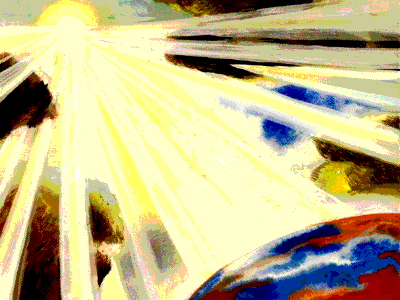
Matthew 13:1–58, Yeshua unlocks fundamental mysteries pertaining to the kingdom of heaven.
Let’s systematically analyze this amazing chapter section-by-section to see if we can unlock some deep mysteries pertaining to the kingdom of Elohim.
In the Parable of the Sower, Yeshua reveals that he is sowing the seeds of the gospel message far and wide across the field of the world (v. 38). That seeds falls on all types of ground and there are external influences (i.e., the world, the flesh and the devil) that affect whether the seed will germinate and come to fruition or not. The bottom line is that the majority of seed gets destroyed along the way and fails to produce fruit.
Yeshua then explains the purpose of parables (see comments on v. 14). The main point of this discussion is that only those who are genuine and earnest truth seekers will find the deep spiritual truths of Yeshua’s kingdom behind his parables. These are the ones who have “eyes to see and ears to hear” who will eventually become part of his kingdom. All others will fall by the wayside having disqualified themselves by their lack of spiritual zeal and tenacity to enter into his kingdom.
Yeshua’s Parable of the Wheat and Tares is an expansion of one aspect of the of the previous parable. In the Parable of the Sower, bad seed (i.e., the sons of the wicked or the lawless/Torahless one, vv. 38 and 41) can also be sown by the enemy (the wicked one or the devil, v. 39) into the field in which the good seed on the good ground is sown. This means that of the seed that is sown there’s a reduction factor of four to one. Only one in four seeds or twenty-five percent comes to fruition. Amongst the remaining twenty-five percent, tares or noxious weeds that are planted by the Satan will grow up around the good seed or wheat. The wheat plants are the saints or the sons of the kingdom (v. 38) or the righteous (v. 43) who must be tried, tested and spiritually refined along the way by the tares amongst them. Will the saints be faithful to the Master, or will they fall victim to the lies and dessemblance of the false saints or satanic elements among them? Distinguishing who are wheat and tares is only possible by evaluating the fruits that are produced (Matt 7:15–20). This takes time to determine as a plant slowly develops and it then becomes evident whether it’s a wheat or a tare. At the end of the age, Yeshua will send his angels to separate out the wheat and the tares (see Matt 24:31 and Rev 7:1–8 cp. 14:14–20). The former will inherit his everlasting kingdom, while the latter will be burned up in the lake of fire.
Through the process of separation, refinement and elimination, the good seed in the fertile ground germinates and begins to spread its roots and grow into a large plant. Though the saints are like many individual plants in Yeshua’s spiritual field, Yeshua likens the expansion of the kingdom of Elohim in the life of the saints to a singular mustard seed that though it is very small, in time it becomes a very large tree-herb in the garden. Even as a large plant that is now well established in Yeshua’s garden (despite the opposition of the tares), the wicked one will continue to send his demonic agents (the birds of heaven, see vv. 4 cp. 19) that will attempt to find shelter within the branches of the tree. As demonic spirits and their agents were attracted to Yeshua (Mark 3:11) and his apostles (Acts 16:16–18), even so in our days, those with demonic spirits will be attracted to the congregation of the righteous.
Next, Yeshua likens his kingdom to the action leaven in bread dough. This is the only reference in the Scriptures to leaven as a positive thing. In this case, bread may be viewed as a metaphor for the spiritual body of Yeshua. Indeed, Yeshua is the bread of life (John 6:26–40) that is unleavened or sin-free. However, when humans become part of Yeshua’s kingdom or spiritual body it will expand, which is a good thing. However, because humans aren’t sin free, but are like leavening (a biblical metaphor for sin), the bread or body of Yeshua will grow, though comprised of sinful humans who have been redeemed from sin. This calls to mind the bread waving ceremony the priests conducted on the Feast of Weeks (Shavuot) where they waved two leavened wheat flour loaves of bread representing the two houses of Israel above the altar before YHVH for his acceptance. Though YHVH is set-apart or holy and hates sin, his mercy triumphs over his judgment against men’s sin, and he graciously accepts humans who have been redeemed from sin by Yeshua the Messiah, who is the Bread of Life. His eternal kingdom will be comprised of imperfect humans who have been redeemed from sin, which is why he likens the expansion his kingdom to leaven being used to expand the bread.
Yeshua then likens the kingdom of heaven to a treasure buried in a field, which a man discovers and sells all he has to buy the field containing the treasure. This parable shows the heart attitude that one must have if they want to be part of Yeshua’s everlasting kingdom. They must seek first his kingdom above everything else in their life (Matt 6:33), and be willing to die spiritually to anything that comes ahead of Yeshua (Matt 10:39; 16:25).
The kingdom of heaven is also like a pearl of great price — an ultimate treasure — that one must be willing to sell all to “purchases.”
The Parable of the Dragnet teaches us that as the gospel is preached, it is like a giant fishnet that is cast out across the seas of humanity. Many people will respond to the glorious gospel message of salvation and the kingdom of heaven. However, like the Parable of the Wheat and Tares, the gospel message will attract both the sons of the kingdom and the sons of wicked into the same field (as in the earlier Parable of the Wheat and Tares) or fishnet (as in the Parable of the Dragnet). Again, Yeshua reveals that at the end of the age, his angels will separate out the good fish (the sons of the kingdom) from the bad fish (the children of the devil). The latter will be cast into the lake of fire (see Matt 24:31 and Rev 7:1–8 cp. 14:14–20).
Yeshua finishes his teaching on the kingdom of Elohim by explaining that only those who study the Bible deeply and diligently will understand these mysteries of the kingdom of heaven. They will view them as priceless treasures and desire to share them with others.
Sadly, Matthew 13 ends by showing that Yeshua’s own friends and family largely rejected his teachings on the kingdom of heaven. “A prophet is not without honor except in his own country and in his own house,” he concludes.



